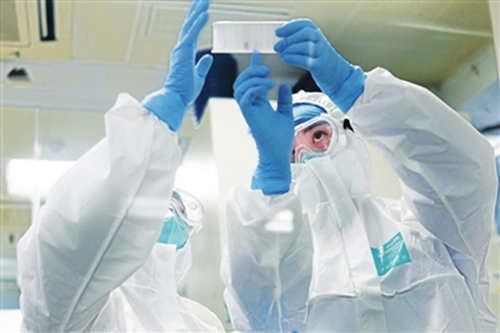Leaders and civilians fortify to prevent, control virus
The government is assuring Zhuhai's population of some 1.6 million that 55 confirmed cases (as of Feb 3, with one recovered so far) of the novel coronavirus (2019-nCoV) are competently under control, that medical facilities and staff are well-prepared for any increases, and that food supplies and daily necessities are plentiful.
The subjects had either arrived from elsewhere or were infected by family members, according to a Feb 2 online press conference on the city's epidemic prevention and control. They are being cared for at the designated municipal treatment center for the virus, 5th Affiliated Hospital of Sun Yat-sen University on East Meihua Road in Old Xiangzhou.
Equipped with negative-pressure wards, the hospital has 400 patient beds and more than 400 medical staff, well beyond what is currently needed, according to Xu Chaolong, director of the Zhuhai Health Bureau.

Medical staff check reagent at Novel Coronavirus Nucleic Acid Testing Laboratory of Zhuhai People's (Renmin) Hospital [Photo by Li Jianshu / Zhujiang Evening Post]
In case of any increase in patient numbers, alternate designated hospitals and more than 800 beds can be employed, while over 2,000 doctors, nurses, and medical technicians are on standby.
The city's Command Center for Epidemic Control & Prevention has stepped up the purchase of masks, ethanol for disinfection, disinfectants, and other emergency materials that have been in short supply since Jan 18. In all, 610,000 disposable medical masks, 5,000 protective suits, 1,300 goggles, and 1,000 disposable surgical gowns have been sent to frontline medical institutions and checkpoints.
Multi-disciplinary expert teams have been assembled for group consultation, diagnosis, and treatment planning under the guidance of provincial expert panels, said Deputy Mayor Yan Wu. Furthermore, Dai Weihui, director of the Zhuhai Finance Bureau, ensured that the city has an adequate supply of vegetables, aquaculture products, pork, eggs, and daily necessities.
On the grassroots level, residents are advised to stay home and wash hands and exercise frequently while maintaining good air flow in their residences. Those with fever or symptoms of respiratory infection should seek prompt medical attention. Do not contact, purchase, or eat wild animals; avoid going to markets that sell live animals; separate cutting boards, knives, and utensils for raw and cooked food; and monitor household members. Cover sneezes and expectorate only in disposable tissues.



